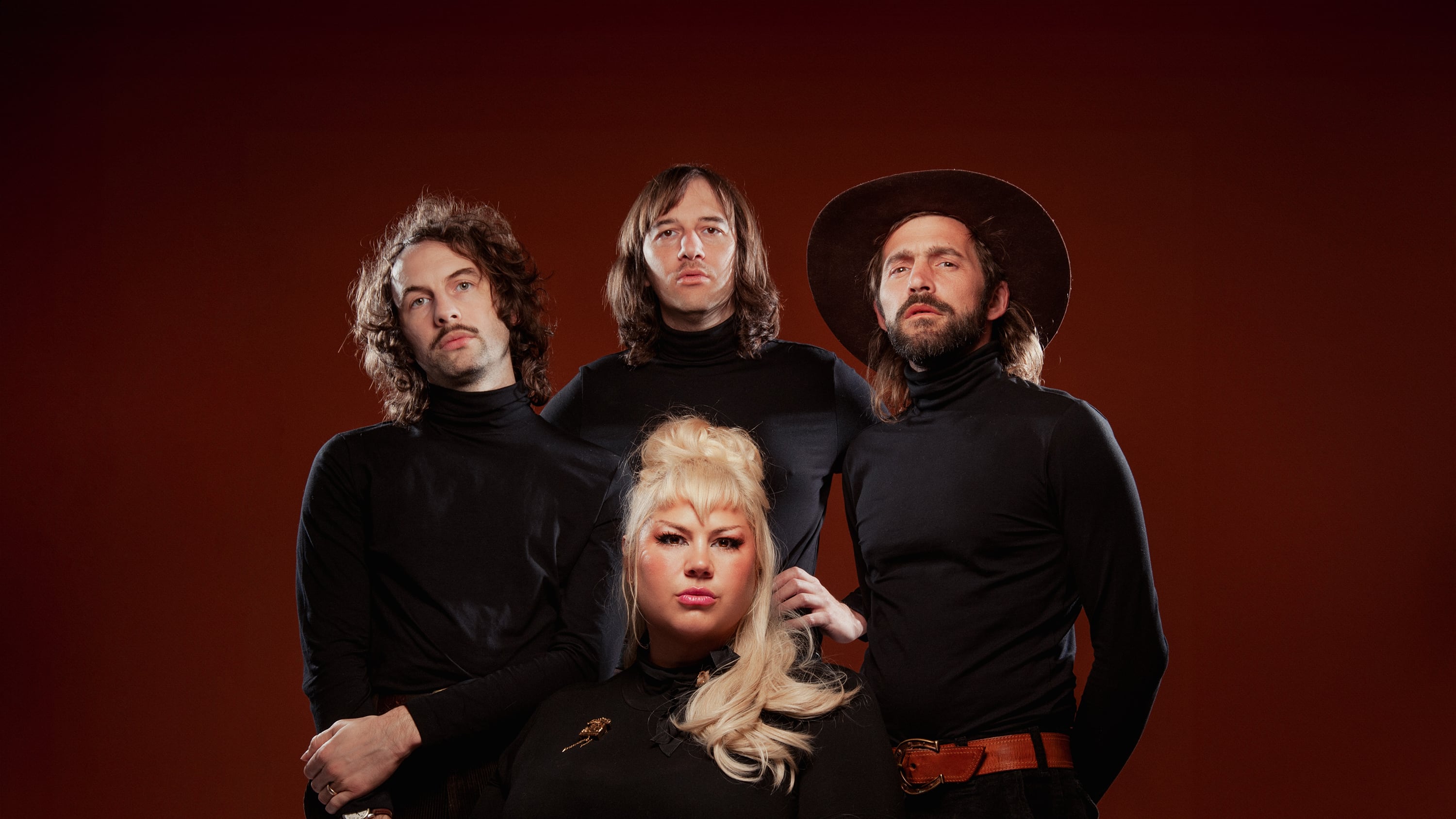Late last month, retro-steeped garage R&B heroes Shannon & The Clams took over Southeast Portland’s boutique roadhouse The Showdown for a frenetic dance party celebrating the release of their seventh album, The Moon Is In The Wrong Place.
Another collaboration with The Black Keys guitarist and producer Dan Auerbach, the new record perhaps inevitably revealed a more thoughtful approach to the beloved Bay Area-bred troupe’s kitsch-fired grooves. It was the first music they’d recorded since the horrific 2022 car accident that took the life of longtime band drummer Joe Haener outside his Salem-area family farm just weeks before his marriage to S&TC frontwoman Shannon Shaw.
The album doesn’t so much whistle through the graveyard as stare down the reaper with an unblinking eye. Sun-strewn garage nuggets like Britpop hootenanny “Bean Fields” and “Big Wheel” with their lovelorn psychedelia feel address the shadows looming over the album, but the sheer love of life that the band finds in their music proves irrepressible.
As the rejiggered quartet wends its way through the southern leg of an extensive (and largely sold-out) national tour—bringing them back to town July 27 for a bonkers Project Pabst lineup alongside Gossip and Billy Idol—Shaw spoke with WW about the challenges of incorporating such emotionally charged material within their famously raucous shows.
WW: How’s the tour going?
Shannon Shaw: Really good! I’ve really been amazed at the reception for this album because the content was so personal. I didn’t really know what to expect, but I just felt this desperate need to share and get it all off of my chest. There was a part of me worried it wouldn’t, like, grab people. That hasn’t been the case. People love it and want to be part of it. We have such great fans, and they’ve been so supportive. It’s been a really beautiful reception.
Given the nature of the new material, was there any change in the crowds? The set lists? What are the shows like?
They’re definitely still really danceable. People are still thrashing around. There’s been no stage diving on this tour, but lots of people are still dancing and singing along. It’s joyous. We still want you to leave feeling good. And, y’know, we want to leave feeling good!
There are tears sometimes, when we play one of the heavier ballads, but we really try to make the set list have a little bit of everything. We don’t want it to be all somber. We want the full adventure—multifaceted, you know? It’s a complicated album, a little more psychedelic than normal, that really runs the gamut of emotions—just like grief does. We do play a lot of the new stuff, but I would not say the album overall is somber. It’s uplifting! Sometimes, when you are in extreme darkness, anything that’s light and bright will stand out more than it did before.
Do you think that’ll continue? Have you worked at all on the next album?
I haven’t thought about [recording] the next one. I think of our albums like yearbooks, capturing our lives in the moment during the period of time when we’re writing. It depends, I guess, when the urge and ability to write songs comes again, but I don’t anticipate not writing about my life.
Do you still live around town?
No, I don’t. I’d moved in with [late fiancé] Joe, and, after he died, I moved away. I still spend a lot of time in Portland and Aurora, though. My time in Portland was kind of a flash in the pan, but still really meaningful. I loved living there, but moving there during the pandemic was weird because a good chunk of the time we lived together was under lockdown. We didn’t really start coming out —going to shows, making friends, interacting with people—until, probably, the last five months that he was alive.
Back to the Bay Area?
Yeah. [Haener] was the reason I moved to Portland, but I loved it. I’m really glad that [his death] hasn’t soured my relationship with Portland and Aurora and the Northwest in general.
How long did you live up here?
Since October 2020? I mean, we were together five and a half years before he died, so I had visited Portland and Aurora a lot leading up to actually moving. I still love it there and feel really good when I visit. My bandmate [guitarist] Cody [Blanchard] still lives there.
Portland holds such a special place in, really, all of our hearts but definitely mine. I loved Mount Tabor so much. The Hollywood’s probably one of the most amazing theaters in the world. I love Laurelhurst Theater, Laurelhurst Park, Laurelhurst Market— just that whole neighborhood. I lived at 22nd and [East] Burnside, and when I lived there during COVID, I would just walk every day for, like, 4 miles through Laurelhurst and into Kerns. I just loved that.
So, holding the album release in Portland wasn’t just logistics?
Launching in Portland was very intentional. We wanted to launch the album in Oregon because, I mean, that’s where Joe’s life started and ended. We actually did part of the launch at the farm—playing an acoustic set for Joe’s family—and then we had the super fun dance party DJ night at The Showdown. I spent so much time out on the farm in Aurora and Marion County. That’s where he worked, and so much symbolism from that time and that place made its way into the record. It just felt right.
GO: Shannon & The Clams play Project Pabst at Waterfront Park, 98 SW Naito Parkway, projectpabst.com. Saturday, July 27. Day pass $115.

